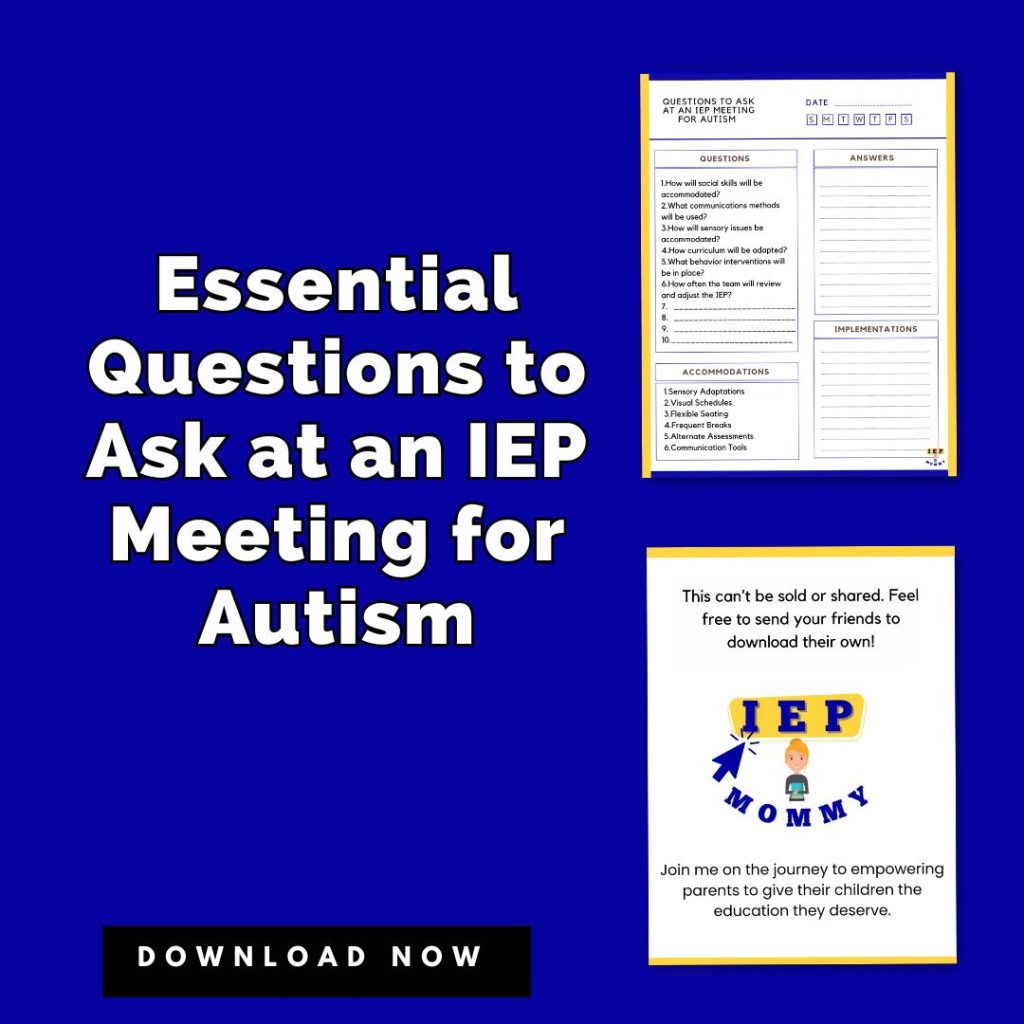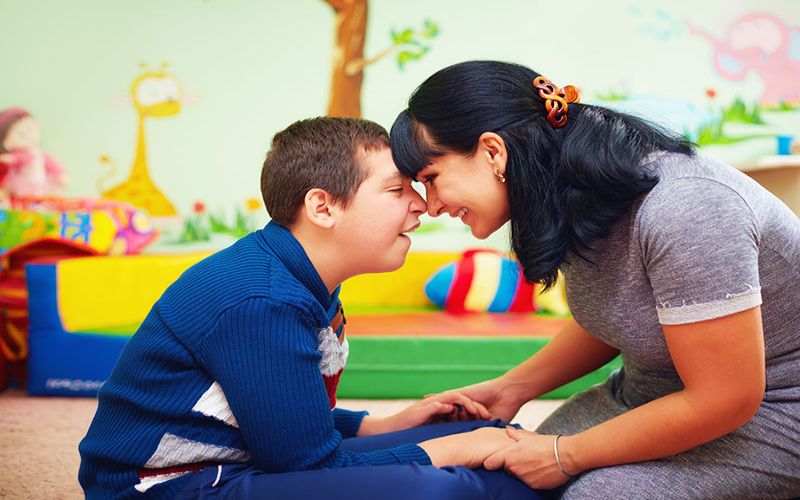Essential Questions to Ask at an IEP Meeting for Autism: For Parents
Understanding the right questions to ask at an IEP meeting for autism is crucial for making the most of this important discussion. You're gearing up for your first (or next) Individualized Education Program (IEP) meeting, and your child has autism. It's a pivotal moment and knowing the right questions makes a difference.

This guide will tackle the essentials: setting autism-specific IEP goals, accommodating your child's special needs, tracking progress, and building a solid relationship with the IEP team. This isn't just another meeting—it's a strategic planning session for your child's educational success. Keep reading to set your child up for the best outcome possible.
How an IEP for Kids with Autism Stands Out: It's Not Your Typical IEP
The world of Individualized Education Programs (IEPs) is enough to make any parent's head spin. Add autism to the mix, and you have a unique puzzle. So, how does an IEP for a child with Autism differ from a standard IEP?
Unique Goals for Unique Kids
When it comes to autism, challenges with socializing and communicating often take center stage. So, you can expect your child's IEP goals to laser-focus on these areas, like boosting social skills and finding creative ways to help them express themselves.
A New Take on Assessments
Your child is one-of-a-kind, so those off-the-shelf tests? Yeah, they might not cut it. Be prepared for your IEP team to recommend specialized screenings and assessments designed specifically for kids with autism.
Sensory Awareness: More Than Just Five Senses
Bright lights and loud noises can be overwhelming for kids with autism. Your child's IEP can lay out a game plan for a sensory-friendly classroom, from noise-canceling headphones to cozy corners where they can decompress.

The Road Less Traveled by Lesson Plan
Does your child have a knack for visual learning or interactive activities? Fantastic! The IEP will embrace that and offer learning strategies for your child's strengths.
Behavior: Not Just Black and White
Managing behaviors takes a nuanced approach when autism is part of the equation. The IEP will likely include specific strategies for dealing with repetitive actions or sudden emotional shifts, making the classroom a smoother experience for everyone involved.
Mastering the Art of Organization
Executive tasks like planning can be a maze for kids with autism. Luckily, the IEP can be crafted to offer strategies that will help your child keep their ducks in a row.
Social Skills 101: The School Edition
Let's get real—navigating the social jungle of school can be complex. Your child's IEP must likely include built-in support to help them form friendships and deal with complex social situations.
Autism-Focused IEP Goals: Tailoring the Blueprint for Success
If you're navigating through your first IEP meeting for your child with autism, the list of potential goals might feel overwhelming. But hey, don't stress; that's what your IEP team is there for. Let's break down some autism-specific IEP goals you'll likely come across.
Social Skills Sharpening
Many kids with autism have challenges with social interactions. Ensure the team develops IEP goals emphasizing friendship development, emotional understanding, and even simple things like eye contact during conversations.
Communication Central
Whether it's verbal or non-verbal, effective communication often needs extra attention in the IEP process for children with autism. Goals could include improving articulation, expanding vocabulary, or fostering interactive communication.

Behavior Tweak-ups
Unpredictable behaviors or repetitive actions can also be an area of focus. Behavior modification goals might include reducing tantrums or helping the child cope with transitions, like moving from one classroom to another.
Sensory Adaptations
Your child's sensory needs are often catered for in the IEP, helping them adapt to various sensory inputs in the school environment.
Academic Goals
Yes, we can't forget those, either! Special education teachers often work closely with your child to tailor academic goals that align with their unique learning style.
Feel free to chime in during your IEP meeting with questions or suggestions. After all, you're an essential part of the team and your child’s most influential advocate.
Must-Ask Autism-Specific Questions in the IEP Meeting: Know What to Probe for Precision
Don’t hold back from asking questions at your child’s IEP meeting. Targeted questions shape your child's individualized education program and ultimately help them succeed in ways best suited to them. Let's get started with some must-ask autism-related questions for the meeting.
- How will social skills be targeted in the IEP goals? You want to know if the IEP will address social norms, understanding cues, and building friendships.
- What communication methods will be used? Are they going to use AAC, PECS, or speech therapy? Your child's communication needs to be a big focus in the meeting.
- How will the school accommodate sensory issues? Kids with autism often have specific sensory needs. How will the school make accommodations, like a quieter environment or sensory-friendly tools?
- What behavior intervention plans are in place? Knowing how the school plans to manage any repetitive behaviors or meltdowns can be a game-changer for your peace of mind.
- How will the curriculum be adapted to my child's learning style? It's not just about what they learn but also how they learn it.
- How frequently will IEP team members review and adapt the plan? This involves special education teachers, therapists, and you. The more coordinated the team, the smoother the journey.
The IEP process is dynamic; the goal is to help your child succeed in school and acquire life skills they'll use forever. Parents are a key player in this process. Don’t hesitate to ask as many questions as needed to get your child's best IEP plan.
For a handy list of these essential questions, don't forget to download our exclusive printable at the end of this post.

Key Autism Accommodations in IEP: Tailoring the Classroom Experience
Let's talk about those super-important IEP accommodations that can make your child's school life way more manageable. Kids with autism often have unique needs that a standard classroom setup may not cater to.
- Sensory Adaptations: Think dimming lights or noise-canceling headphones. Anything to make the sensory environment less overwhelming
- Visual Schedules: A picture-based daily routine can be a game-changer, especially if your child is a visual learner.
- Flexible Seating: Sometimes, a wiggle cushion or standing desk is all it takes for better focus.
- Frequent Breaks: Scheduled downtime or quiet periods can help manage stress levels and improve overall behavior.
- Alternate Assessments: Your child may need assessments that cater to their specific way of learning, not just the standard written tests.
- Communication Tools: Depending on your child's needs, AAC or PECS systems might be introduced into the classroom setting.
Every child's IEP is as unique as they are, so make sure to consult with your IEP team, including special education teachers and other professionals, to find the best fit for your child.
Grab our printable guide to these crucial accommodations—it's available at the end of the article.
Monitoring Progress and Adjustments: Keeping Tabs the Smart Way
Once the IEP is implemented with autism goals and accommodations, the next step is to ensure the IEP is effective. This is accomplished by tracking progress in different ways.
- Data Collection: Whether through charts, notes, or any other format, consistent data collection can give a clearer picture of how your child is faring.
- Scheduled Meetings: Don't underestimate the power of those IEP meetings. They're the perfect time to review achievements and setbacks and plan the next steps.
- Behavioral Observations: Observing social skills, repetitive behaviors, and other autism-specific indicators can tell you what's working and what needs a tweak.
- Parent-Teacher Communication: The more you and your child's teacher can be on the same page, the better. Regular check-ins can provide insights that formal assessments might miss.
- Adjustments: If something's not cutting, don't hesitate to reevaluate and tweak those IEP goals or accommodations.
Remember, this is a marathon, not a sprint. Adjustments are an integral part of the IEP process. The goal is to keep fine-tuning your child’s IEP so they can be successful in school.
Communicating with the IEP Team: How to Be Your Child's Best Advocate
Getting your points across during an IEP meeting can be stressful, especially when you're navigating the world of autism-specific needs. Communication is your power tool here.
- Prep in Advance: Jot down your concerns and questions before the meeting. This ensures you cover all your bases, from specific IEP goals to behavioral needs.
- Be Vocal: You know your child best. Don't hesitate to speak up about what you think they need, whether it's related to executive functioning, social skills, or other specific autism-related challenges.
- Work Collaboratively: The IEP team, including the special education teacher and other education professionals, is there to work with you. Open dialogue fosters a more tailored and effective Individualized Education Program.
With a well-planned approach and communication, you can ensure that the IEP process aligns well with your child's unique needs related to autism.
There's no underestimating the power of being a proactive parent when it comes to your child's IEP for autism. Every question you ask, and every goal you set supports your child’s school success.
Everyone plays a part, from special education teachers to IEP team members, but remember—you're the MVP in this process.
Don’t forget to subscribe to continue strengthening your position as your child’s best advocate. If you found the questions and accommodations useful, remember to download and print them for your child’s next IEP meeting.







